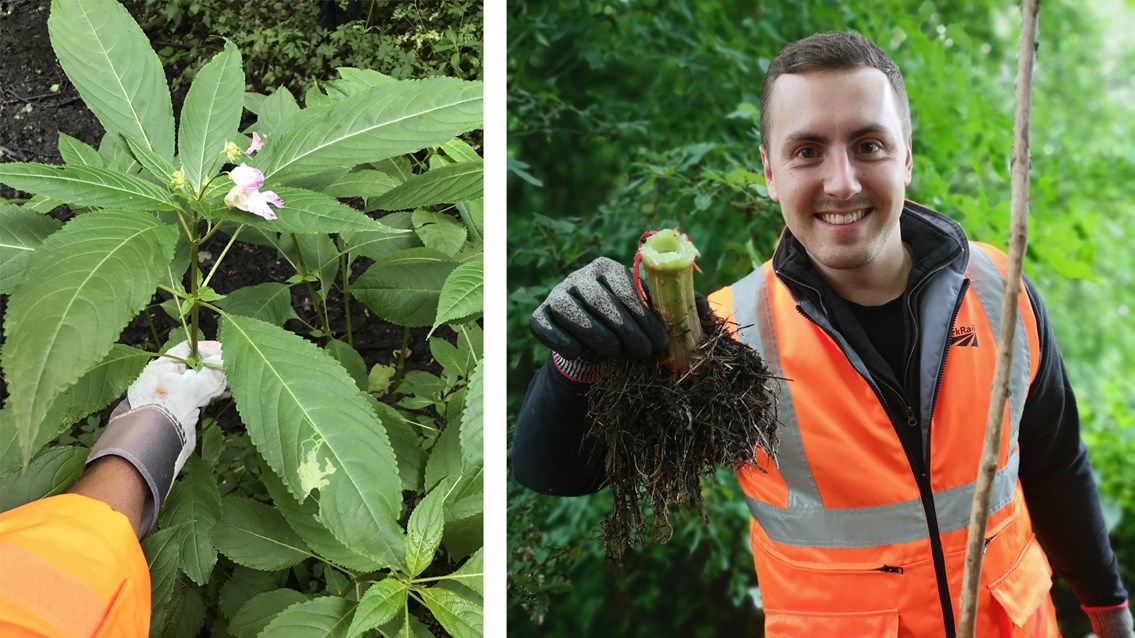Tuesday 1 Aug 2023
Volunteers help stop one of UK’s most invasive plants at beauty spot
- Region & Route:
- North West & Central
- | North West & Central: North West
Railway volunteers have helped to rid a nature reserve in Stockport of one of Britain’s most invasive alien plant species.
On Wednesday 19 July, a dozen Network Rail staff joined forces with members of the Gatley Carrs Conservation Group to stop destruction caused by Himalayan Balsam.
The non-native weed, which has a stronghold on local rail embankments, risked infesting the local beauty spot which is wedged between the railway and the M56 motorway.
Riverbanks, railways and waste land are the perfect breeding ground for Himalayan balsam to spread rapidly.
It greedily gets an early start in spring and quickly shades out native plants so that by summer it has often taken control of the entire habitat.
Every plant has pods containing more than 500 seeds each which then explode in the autumn, allowing seedlings to set root up to seven metres away.
To combat it, the volunteers took part in a process known as ‘balsam bashing’ pulling up the invasive weed before its seed pods are big enough to burst.
Chris Sutton, an ecologist at Network Rail who took part, said: “Usually you have to call in specialist contractors to clear Himalayan balsam, so we were happy to use our volunteer leave to lend our graft and knowledge, and help reduce these costs.
“This invasive plant is a huge blight on the railway and native biodiversity in general so anything we can do to share best practice and slow the spread in beauty spots like Gatley Carrs is the least we can do.”
Emma Burrows, from the Conservation Group, said: “A great day’s work and a huge bash on the balsam, thanks to Network Rail and their volunteers for helping to keep this invasive plant under control.”
Thanks to the GCCG and the work of the volunteers, the growth of Himalayan balsam has been dealt severe blow in the area.
For more information on Network Rail's ecology work you can visit www.networkrail.co.uk/sustainability/.
Notes to Editors
The main organiser was Clair Hickey, a Network Rail project management assistant at the company's Stockport Heaton Mersey office. The 11 other Network Rail attendees were from the Communications, Works Delivery and Geotech teams.
About Himalayan Balsam
- Himalayan balsam was introduced to the UK 150 years ago as an ornamental plant, but quickly spread into the wild.
- Each plant can have more than 500 seeds per pod. When the seed pods are ripe in the autumn, the slightest touch causes them to burst open catapulting and dispersing the seeds up to 7m away.
- It is often found growing along rivers, disused railway lines or in similar linear corridors.
- It is one of the most invasive species in the UK as it dominates habitats, grows densely and shades out native plants
Contact information
Passengers / community members
Network Rail national helpline
03457 11 41 41
Latest travel advice
Please visit National Rail Enquiries
Journalists
Network Rail press office - North West & Central Region
0330 854 0100
NWCmediarelations@networkrail.co.uk
About Network Rail
We own, operate and develop Britain's railway infrastructure; that's 20,000 miles of track, 30,000 bridges, tunnels and viaducts and the thousands of signals, level crossings and stations. We run 20 of the UK's largest stations while all the others, over 2,500, are run by the country's train operating companies.
Usually, there are almost five million journeys made in the UK and over 600 freight trains run on the network. People depend on Britain's railway for their daily commute, to visit friends and loved ones and to get them home safe every day. Our role is to deliver a safe and reliable railway, so we carefully manage and deliver thousands of projects every year that form part of the multi-billion pound Railway Upgrade Plan, to grow and expand the nation's railway network to respond to the tremendous growth and demand the railway has experienced - a doubling of passenger journeys over the past 20 years.
Follow us on Twitter: @networkrail
Visit our online newsroom: www.networkrailmediacentre.co.uk

